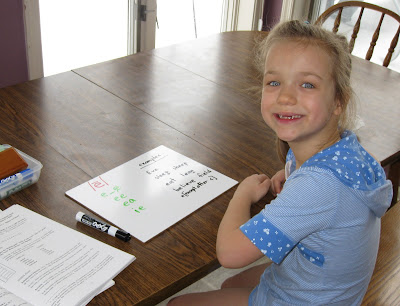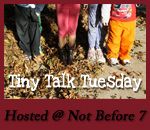Phonics/Spelling:
We plodded through our CCC workbook covering the long /e/ sound when spelled (e consonant silent e), (ea), (ee), and the oh.so.difficult because it doesn't follow our 2-vowel rule, (ie). I find that the rules for using each of these in words are becoming too many for her to manage, so I'm trying to just expose her to as many examples of each as I can through copywork and add to her spelling list (since her spelling 'tray' helps her to 'velcro' the words into her head better). I assume that as she sees the usage of these phonograms more and more over her elementary years, her spelling will improve. (Maybe I'll run her through a Spelling Workout book over the summer to see how she does...)
On another note, I'm looking for advice on 'decoding' words... or breaking them down into syllables with correct accent and vowel sounds marked. At what point should a student learn this? This part of the lesson always tortured Jefferson (as well as me) and is now bringing the glazed deer-in-headlights look to her eyes torturing Reagan also. She just doesn't seem to be able to hold all the 'rules' for syllable breaks, accents and vowel sounds in her head...so every lesson is like a new lesson instead of one that builds on previous knowledge. Will this info get picked up later? How will this skill help her - in reading...spelling??
Writing/Penmanship:
As I can see her motorskills improving and her hand becoming stronger, I am trying to give her 1 to 3 lines of copywork each day (we started the year with that much per week). She is finally writing more quickly but her penmanship still looks wonderful. I never thought we'd get past all her little kinks and backwords habits she'd had! With some good spelling basics under her belt and the ability to read, she is also becoming confident enough to write her own little stories. She does this on papers and cards and little homemade 'books' and has a great time with her imagination! I try not to correct these writings unless she asks me because I want to encourage her confidence in writing down the things on her mind. I love the initiative she shows!
(A Lightning McQueen book written & illustrated for little brother, A)
Grammar (FLL):
I love that these lessons are so short - they don't seem to burden her that way and I can fit them in here or there. She is gaining a better feel for the noun, proper and common, while learning some basics, like her address and how to abbreviate. She memorized the poem "Work" by Anonymous in two days (shocking me, as usual, with her memory). I wrote down her narration of "The Girl Who Wanted to be Dirty" and she illustrated it.
Math:
One of our first tough weeks in this subject - I was surprised! It turns out that she needs some more practice partitioning numbers up to twenty (ie. 20=8+5+5+2). I really want her to have a good grip on mental adding strategies before she moves on to harder topics. Right now she is working on adding by "completing the ten", "two five's", "adding nines" (always one less) and seems to be able to add most 2-digit numbers that I give her, even if they 'trade' over into the next place number. She still needs practice at this, so we are working on card games since they keep her interested and relaxed (I looooove Right Start's card games! I have no problem resorting to 'trickery' of this kind to get strategies into student's brains - lol!). But even the games didn't seem to keep her from getting frustrated this week with the partitioning, as she would start crying almost as soon as she hesitated at an answer. It was as difficult for me, the teacher, as it was when Jefferson used to deal with frustration! The real lesson for them is that practice is more important than fast or correct answers! I'm hoping that next week the practice will result in a more relaxed and confident student (and fewer greys hairs for me!). I am happy that we are still progressing well and have plenty of room for the practice that she needs as this foundational mental math is sooooo important.
And all this in just one week! Surely I could learn to make my post a little more concise so I'd be more likely to keep up with journaling her progress. But hey....there's always next week's report...

















3 comments:
Just my two cents. I'm an English major. I still screw up accent marks. I think that is because we go off of how we hear the words pronounced, and that will differ based on where you grew up. I had an English professor who had a horribly thick Ozark accent. Even though he was speaking American English, I missed a lot of what he said. I don't remember having to mark accents on the PSAT, ACT or any test I took in college as an English major. So my advice - don't sweat it. As for syllables, I always teach my kids to clap the words out. Now, I will admit that my kids have a God given music ability, so perhaps that helps them. But when they clap it slowly, they always get it. Glad to hear you are having a good school year.
I agree! Just do syllabification orally, clapping, stomping, tapping on the table with a pencil, with percussion instruments...using poetry helps...talk about music with a different note for each sound...until the idea that words are made up of syllables is well and truly made real and concrete. Plenty of time well down the track to do it in a more abstract and theoretical sense.
Thx! Those are good ideas! I don't want to stress about it cuz that just shuts her down. I'm thinking that she can pick it up better when she's got a better grip on abstract things (not her strong point which is why I was nervous about starting any 'formal' grammar)
Andrea
Post a Comment